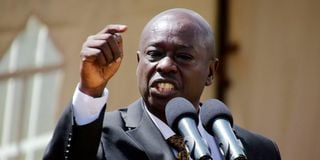Premium
Gachagua seeks out-of-court settlement with governors in battle for road billions

Deputy President Rigathi Gachagua
What you need to know:
- About 15 per cent of RMLF collections between the 2015/16 and 2020/21 financial years were allocated to counties.
- National Assembly last month adopted a formula that excludes counties from RMLF billions for the 2024/25 and 2025/26 financial years.
Deputy President Rigathi Gachagua has convened a meeting of governors and relevant government stakeholders to seek an out-of-court settlement over Parliament's decision to exclude devolved units from billions of shillings collected through the Road Maintenance Levy Fund (RMLF).
This was one of the seven key decisions taken at the 21st ordinary meeting of the Intergovernmental Budget and Economic Council (IBEC) held in Nairobi on Friday and chaired by the Deputy President.
About 15 per cent of RMLF collections between the 2015/16 and 2020/21 financial years were allocated to counties, but the National Assembly last month adopted a formula that excludes counties from RMLF billions for the 2024/25 and 2025/26 financial years.
Governors have been lobbying Parliament to rescind the decision and instead adopt resolutions from the County Government Coordination Summit held in Naivasha in February to allocate 20 per cent of the RMLF to counties.
The county bosses had also threatened to go to court, arguing that their exclusion from the funds was unconstitutional as the devolved units are mandated by the Constitution to build and maintain county roads.
“The Council resolved to convene a consultative forum next week bringing together the Council of Governors, the Ministry of Roads, various roads agencies, CRA and relevant stakeholders,” DP Gachagua said on Friday.
“The forum aims to facilitate discussions on the equitable distribution of funds from the RMLF between the two levels of government with the intention of reaching an out-of-court settlement.”
However, governors failed to reach an agreement with the national government on their request for Sh13.1 billion to prepare for El Niño rains expected this month.
The county bosses had argued that they need Sh15 billion to prepare for El Niño and have budgeted only Sh1.9 billion in the current financial year, leaving a shortfall of Sh13.1 billion.
“The total budget required to avert, minimise, and respond to the effects of El Niño is Sh15 billion. This requires the national government and development partners to support in funding the deficit,” the governors said.
The government has also agreed to release Sh52.05 billion in conditional grants to the 47 counties. The disbursement has been delayed by the lack of inter-governmental agreements between the National Treasury and the counties, which are required by law before the money is released.
The Public Finance Management (PFM) Act of 2012 was amended last year to obligate the National Treasury to enter into agreements with the devolved units before the disbursements are made.
Counties were allocated Sh385.4 billion by the Treasury as equitable revenue share for the financial year 2023/24. Mr Gachagua said the exchequer has so far released Sh61.1 billion of the allocations due for the month of July and part of August.
“...Sh52.051 billion to be disbursed as conditional grants to counties. To overcome difficult fiscal space, counties with low bank balances at the Central Bank are prioritised,” Mr Gachagua said.
He added: “The Council directed that Parliament be requested to waive the requirement under the law and a task force has been established to develop the agreements.”
The deputy president has also urged governors to throw their weight behind the Kenya Kwanza government's sugar sector reforms, which have seen Sh117 billion of debt owed by public sugar millers written off.
This comes as the state prepares to hold conferences for stakeholders in the sugar, milk and maize sectors, following similar conferences held this year for tea and coffee stakeholders.
"A consultative meeting for the sugar industry will be held within the next week," the DP said.
The IBEC meeting came just days after the government partially lifted the 2019 moratorium on mining licences, which is expected to give a boost to districts that receive royalties from mining activities. The Council has proposed that community-based projects be implemented in the devolved units to accelerate the growth of the sector and generate revenue from minerals.
The Deputy President has also convened a meeting between the Controller of Budget (CoB), the Council of Governors and the National Treasury to resolve the thorny issue of outstanding county bills.
According to official figures, the national government owes about Sh481 billion to suppliers while the 47 counties owe Sh159.9 billion in what has become a thorny issue for the Kenya Kwanza administration.





